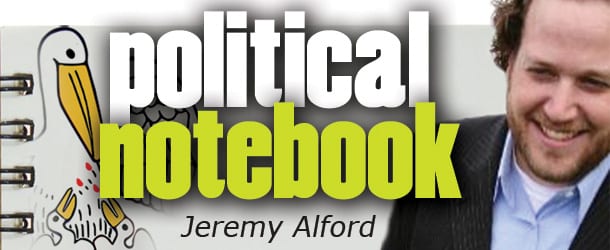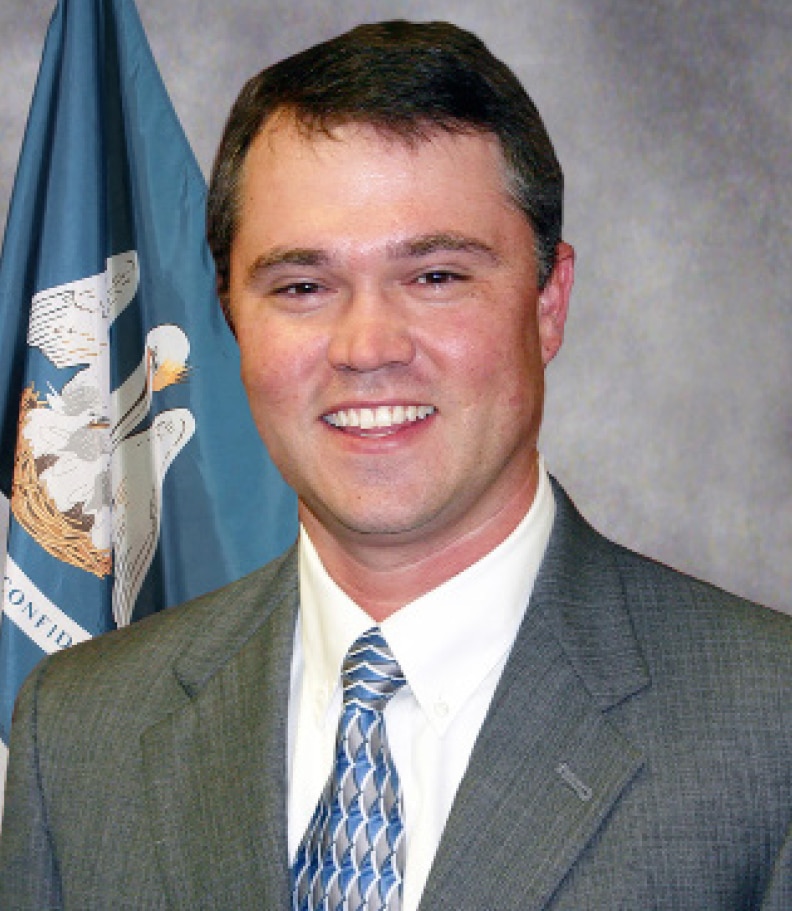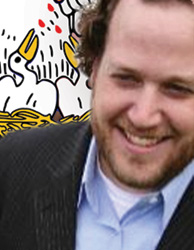The latest name to surface in the developing race for speaker of the state House is Rep. Stephen Dwight of Lake Charles, a second-termer-to-be who sent a letter to supporters announcing his bid for the big gavel.
Dwight, a Republican like all the other contenders, announced he created LA United PAC for the January internal election in which representatives will be asked to choose their chamber leaders.
“My goal as speaker is to have a united body that wants to work together, strives to compromise and truly desires to make a difference for the people of Louisiana,” Dwight wrote in his letter.
Among those preparing to enter their fifth year of elected work at the Capitol, there’s also a big push from Rep. Jack McFarland of Jonesboro, who, like Dwight, would be the first second-term speaker elected since former House Speaker E.L. “Bubba” Henry in the early 1970s.
Looking toward the class of third-termers, there’s quiet chatter building around a consensus candidacy from Rep. Ray Garofalo of Chalmette. He said he will soon be forming his own leadership PAC.
As stated in recent reports, Reps. Stuart Bishop of Lafayette, Sherman Mack of Albany and Alan Seabaugh of Shreveport are mounting bids as well, and for now are all serious contenders.
If fundraising and money are to be determining factors, then Bishop remains the contender to watch, with $100,000 in his PAC and $260,000 in his campaign account — far more than any other announced candidate for House speaker.
A Crowded House Race
In case you were wondering which legislative district fielded the most candidates this cycle, it was House District 98, which is anchored by Uptown New Orleans and includes a portion of storied St. Charles Avenue, near Tulane and Loyola Universities.
A field of seven Democrats (no room for the GOP here) are vying for control of essentially three neighborhoods in the race to replace Rep. Neil Abramson. The outgoing Ways and Means chairman was a Democrat, but he sometimes governed to the right of his constituency.
Perhaps that’s why the mostly liberal candidates are campaigning in a manner that suggests they are somehow flipping the seat back.
Most notably, the field includes attorney Evan Bergeron, who could potentially become the chamber’s first openly gay man. Kea Sherman, who helped fuel the recent EMERGE wave, and attorney Ravi Sangisetty, a known politico, are in the field as well. Also running are Aimee Adatto Freeman, Marion “Penny” Freistadt, Max Hayden Chiz and Carlos L. Zervigon.
Invasion Of The Giant Mailers
We may need bigger mailboxes.
While larger format direct mail pieces aren’t an operational trend specific to this election cycle, they will again be impossible to miss as voters continue to open their mail boxes this year.
That’s because more candidates seem to be trending toward larger mail pieces. (And by large, think 17 inches by 11 inches when opened.)
This cycle, there are a few offerings on the legislative level, from Baton Rouge-based candidates Scott McKnight in House District 68 and Carlos Zervigon in House District 98.
The Data and Marketing Association, a 100-year-old trade organization for marketers, completed an exhaustive report on response rates at the end of 2017, and found that oversized pieces, such as those used by McKnight and Zervigon in this cycle, increase response rates by 10.4 percent.
Direct mail remains an attractive vehicle for many campaigns, legislative or not, and budgets for such efforts appear to be as strong as ever.
Last year, political mail revenue was $563 million for the United States Postal Service. This figure was 31 percent above expectations. USPS officials estimated every registered voter in the country received 24 pieces last cycle. That’s 2.7 billion pieces nationally.
Political History: Gubernatorial Members Of Congress
Louisiana has had 20 governors who were also elected to serve on Capitol Hill, starting with our very first chief executive, William C.C. Claiborne.
Before he became territorial governor in 1803, Claiborne ran for and won a seat to the U.S. House in Tennessee in 1797, making him Louisiana’s only governor to represent another state via federal office.
According to his gravestone, Claiborne was 23 when he was elected to the House — two years shy of the constitutionally required age.
There’s at least one letter from Claiborne to George Washington, who was in his final months as president. In it, Claiborne vaguely addresses his age without giving up a number.
Despite not being old enough, Claiborne was sworn into office, replacing Andrew Jackson, who would go on to win the Battle of New Orleans and become president.
There were 12 Louisiana governors overall who were elected to the U.S. House, the most recent being former Gov. Bobby Jindal, who held the post before moving into the Mansion.
There were also eight Louisiana governors who were elected to the U.S. Senate, the most recent being Huey P. Long, who held off on taking his seat until he could secure a successor for governor. Long was sworn in as the 1932 congressional session started but was absent more than half of the time of his term.
Three Louisiana governors actually served in both the House and Senate: Henry Johnson, William P. Kellogg and Newton C. Blanchard.
Intraparty Legislative Races
Of the 96 legislative races on Louisiana’s October primary ballot, 42 will pit members of the same party against each other.
The tally includes 25 all-GOP House and Senate elections and another 17 races with nothing but Democrats. That’s based on information from the qualifying process and related information compiled by the Secretary of State’s Office.
What that means is that 44 percent of all of the competitive legislative elections this cycle will come down to intraparty battles.
Consultants and other campaign professionals suggest it’s an unprecedented figure and that the trend is strengthening.
Moreover, the uptick in intraparty legislative races signals a transition to full partisanship in the Legislature, which has experienced a gradual but aggressive Republican takeover during the past three election cycles.
In other words, the transition and segmentation are complete — or, as Baton Rouge pollster Bernie Pinsonat is fond of saying, if a Capitol politician is in the middle, that Capitol politician is probably roadkill.
On both sides of the aisle, it no longer matters whether a candidate is a Democrat or a Republican, Pinsonat and others have noted; what matters now is how Republican or how Democratic the candidates appear.
A larger drive for this R versus R and D versus D development has been Louisiana’s unique open primary system, referred to by some as a “jungle primary system,” in which all candidates are pitted against each other on the same ballot, regardless of party.
Last year, Louisiana Republican Party Chairman Louis Gurvich offered an op-ed to newspapers around the state complaining about the only statewide race on the ballot in 2018. That took place when a special election was called for secretary of state. But Gurvich’s editorial could just as well have been reserved for the ongoing cycle.
“Until that hallowed day when the return to closed primaries finally dawns in Louisiana,” he wrote, “we as a party must also insist that potential Republican candidates carefully assess their chances of winning before declaring for any race.”
Democratic Party officials in the state have pushed for a return to the closed primary system as well, although they have done so more sparingly, and usually in regard only to federal elections.
Fabio Franchino and Francesco Zucchini, who published studies in the Political Science Research and Methods journal, noted that two major U.S. parties were best described as “loose organizations that let their politicians enjoy substantial autonomy.”
They also reasoned — in an explanation that was fashioned to fit Washington’s framework more than Baton Rouge’s — that “the executive does not need the support of a majority party in the Legislature to survive and thus does not need to discipline legislators.”
Five New Members Head To House, Senate
A total of 48 members of the Louisiana Legislature were elected without opposition following the qualifying period. The numbers broke down to 37 in the House and 11 in the Senate.
There are 144 seats in the Legislature.
The newest members of the Senate next term will be Senators-elect Katrina Jackson of Monroe and Jimmy Harris of New Orleans. Both Democrats are well-known transplants from the House, with Jackson representing north Louisiana and Harris calling the southeast home.
Their early elections could be a positive sign for legislative members looking to switch chambers.
Due to a lack of opposition, the newest House members for the next term will be attorney Thomas Pressly in House District 6, in the Shreveport-Bossier region, and Michael Echols in House District 14, which is anchored by the Monroe-Bastrop area.
Technically a freshman, but also a former member of the lower chamber, Sen. Francis Thompson will join these politicians in returning to his old House seat in District 19, in the Delhi area.
Health Care Contract Becomes Issue
Political observers, such as columnists and radio show hosts, already knew the Democratic and Republican governors associations were going to have roles to play in Louisiana’s 2019 race for governor.
And these prognosticators also knew there would be super PACs and so-called dark money and trackers and so on and so forth — all contributing to the tapestry of this election cycle.
But had they been asked a few months ago who would become the health care heavy in the state’s top race, many would likely have paused before mumbling something about hospitals or physicians or nursing homes.
That said, if you’ve driven anywhere in the Baton Rouge region in recent weeks, you’ve noticed that the state’s Medicaid managed care contract dispute has developed into an advertising bonanza, with Gov. John Bel Edwards in the crosshairs.
LaPolitics.com subscribers have submitted photos of digital billboards purchased by a group called Caring Health Solutions.
The ads, which appear to be part of a large-scale, targeted digital buy — based on a click-through page passed along to LaPolitics — urge voters to call Edwards and raise hell about the fallout from the new Medicaid contracts.
Louisiana Healthcare Connections and Aetna both filed protests to the Independent Office of Procurement recently.
This paid media campaign shows the issue — reported problems in the procurement process, potential job losses and the untenable task of moving 500,000 Medicaid recipients to another plan by Jan. 1 — isn’t going anywhere.
This Medicaid mambo could become a major theme in the governor’s race.
The Democratic incumbent, who is relying on the popularity of the Medicaid expansion in his most recent advertising, now faces a new contender in the battle to win hearts and minds. And this contender is aiming to undermine his reputation on the very issue that can inspire his base to turn out.
Businessman Eddie Rispone of Baton Rouge and Congress Ralph Abraham of Alto are among the other top candidates running for governor this year. Both are Republicans.
The Next Supreme Court Judge
In the black robe category of this year’s election pageant, the big race will feature a ground war for the First District seat on the Louisiana Supreme Court.
The field doesn’t exactly offer variety, with four white men running as Republicans to serve on the state’s highest court.
Trial attorneys and the business lobby love to play in these high profile races, with the former besting the latter more often than not. But this election in the New Orleans suburbs is an interesting one that should heat up the shores over the next few weeks.
Appellate Judge Will Crain of Madisonville and Richard Ducote of Covington, as well as Appellate Judge Hans Liljeberg and District Judge Scott Schlegel, both of Metairie, are in the running.
In earned media competition, Ducote got to first base recently when he “filed a lawsuit to declare the state statute calling for secrecy in judicial investigations unconstitutional,” according to The Advocate.
Politically, Crain, an appeals judge, is at the heart of a campaign that’s gaining the attention of industry leaders and company heads. When it comes to cash and outside spending, he probably feels fairly comfortable.
From a regional perspective, the voter-rich region of Metairie is going to be a battleground, with both Liljeberg and Schlegel looking to protect and gobble up turf. A few local politicos have described Schlegel as a “wild card” who could turn heads over time.
What’s In A Name?
Candidates for office in Louisiana are allowed to put their nicknames on the ballot in quotation marks. Sometimes the nickname helps them win races or at least get attention.
At the top of the ticket in the governor’s race, there’s Patrick “Live Wire” Landry, who shouldn’t be confused with the live wire incumbent attorney general Jeff Landry, who’s running in his own race.
Michael “Big Mike” Fesi of Houma is running in Senate District 20, but he is not running in HD 78, because that’s John “Big John” Illg, Jr., of Metairie, who is facing off against a candidate with a very artistic nickname: Ralph “Rem” Brandt of Jefferson.
Also running are:
— Fred “T-Fred” Mills in SD 22
— “Phil Cowboy” Lemoine in HD 38
— Belden “Noonie Man” Batiste in HD 97.
They Said It
“My philosophy in politics was once I got old enough to look in the arena and see what was going on, I decided I never wanted to run for anything. But what I wanted, though, was to get up close to the top and lay in the weeds.”
— Late attorney and lobbyist Ted Jones, on Louisiana Public Broadcasting’s Louisiana Legends
“There will never be another like him … His was truly a life well-lived.”
— Northwestern State University President Dr. Chris Maggio, on the death of Jones, on KALB-TV
“They end up doing nothing.”
— Former Gov. Edwin Edwards, commenting on the current crop of elected politicians in America, as he turned 92, in The Advocate
“One thing I love about my job: There’s never a recession in Louisiana politics.”
— Gambit’s Clancy DuBos, on WWL-TV
“The ghost of Huey Long still walks the state capitol in Baton Rouge in many places, but we finally took it back … And in just a short period of time, you can do that too.”
— Congressman Steve Scalise of Jefferson Parish, to the GOP faithful at the Illinois State Fair, in The Herald And Review















Comments are closed.